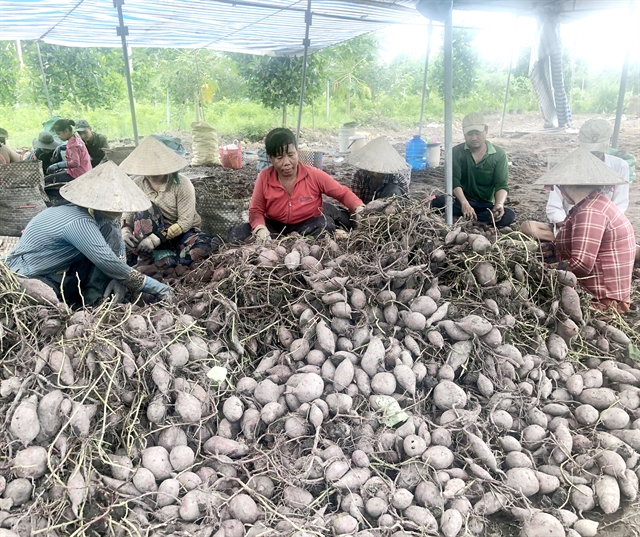 Society
Society

Authorities in the Cửu Long (Mekong) Delta are taking measures to boost the sales of agricultural products as travel restrictions to prevent the spread of COVID – 19 affect them.

|
| Farmers harvest sweet potatoes in Đồng Tháp Province’s Châu Thành District. – VNA/VNS Photo Nguyễn Văn Trí |
HCM CITY – Authorities in the Cửu Long (Mekong) Delta are taking measures to boost the sales of agricultural products as travel restrictions to prevent the spread of COVID-19 affect them.
Farmers in the delta’s 12 provinces and Cần Thơ City, the country’s largest producer of rice, fruit and seafood, are finding it hard to sell agricultural products outside their locality.
Besides being consumed within the delta, a large proportion of the products are normally sold to HCM City and other localities, and exported.
Most farmers sell them through traders.
Nguyễn Minh Lâm, deputy chairman of the Long An Province People’s Committee, said some key local items like rice, vegetables, dragon fruit, lemon, and seafood were being harvested now, but farmers had difficulty travelling to their fields, tending crops, harvesting, and selling amid the implementation of the Government’s Directive 16.
In Châu Thành District, farmers were selling dragon fruit at a low price of VNĐ 2,000 – 6,000 a kilogramme because many traders stopped buying because of the difficulties they had in travelling through COVID checkpoints.
The province People’s Committee had instructed relevant departments and agencies to create favourable conditions for farmers.
In Cần Giuộc District, the province’s largest vegetable growing area, the Bureau of Agriculture and Rural Development is helping co-operatives buy and transport vegetables through checkpoints.
It is also acting as a link between local co-operatives and co-operatives and convenience stores in HCM City to help them sell vegetables.
In Hậu Giang Province, as of July 28 farmers had more than 2,700 tonnes of vegetables, fruits, seafood, and livestock for which they could not find buyers since few traders were buying, according to its agriculture department.
Trương Cảnh Tuyên, permanent deputy chairman of the province People’s Committee, said local authorities had been ordered to set up groups for harvesting and buying agricultural products.
They needed to establish wholesale marts for buying agricultural products, he said.
The province Department of Industry and Trade had been instructed to update information about agricultural output on online selling platforms to promote their sales, he said.
The two departments should link up with processing companies that had refrigerated warehouses for temporary storage, he added.
Hậu Giang is expected to produce more than 262,000 tonnes of agricultural products this month but can consume only 21,000 tonnes, according to its agriculture department.
Trần Chí Hùng, director of the department, said it would both ensure enough supply for locals, especially those living in locked-down areas, and boost sales to other localities including HCM City.
In Đồng Tháp, the province agriculture department is helping co-operatives and co-operative groups tie up with companies, supermarkets and shops nation-wide to sell their produce.
The province is expected to produce 550,000 tonnes of rice, 30,000 tonnes of mango, 21,000 tonnes of lemon, and 11,000 tonnes of longan among various agricultural produce during the rest of this year.
Other major items such as sweet potato, tra catfish, guava, and mandarin also need linkages between farmers and outlets.
In Vĩnh Long Province, various agricultural products including sweet potato, grapefruit, lemon, and rambutan are sold at below production costs but still cannot find buyers, according to its agriculture department.
Some 103 tonnes of grapefruit, 460 tonnes of longan and 248 tonnes of rambutan are unsold.
Nguyễn Trung Kiên, deputy director of the province Industry and Trade Department, said since transporting to other localities remained difficult traders only buy small quantities or not at all.
The department was working with its counterparts in other cities and provinces, especially HCM City and Cần Thơ, to sell agricultural products.
It had tied up with post offices to transport them.
Nguyễn Văn Liêm, deputy director of the agriculture department, said: “The department has set up a hotline to receive information about problems in transporting agricultural products and solve them.”
It was also providing information to companies and establishments so that they could contact the province’s farmers and co-operatives to buy agricultural produce, he added. – VNS




